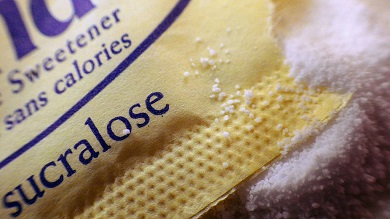Common Artificial Sweetener Sucralose Found to Impact T Cell Immune Response In Mice. Potential Therapeutic For Autoimmune Diseases?
Autoimmune-Diseases - Sucralose - T-Cell Immune Response Mar 16, 2023 2 years, 6 months, 4 weeks, 2 days, 2 hours, 19 minutes ago
Autoimmune Diseases: Scientists at the Francis Crick Institute have discovered that high consumption of sucralose, a widely used artificial sweetener, can reduce the activation of T-cells, a crucial part of the immune system, in mice. If this effect can also be observed in humans, sucralose may be employed therapeutically to regulate T-cell responses, such as in patients with autoimmune diseases who experience uncontrolled T-cell activation.

Sucralose is an artificial sweetener that is approximately 600 times sweeter than sugar and three times as sweet as both aspartame and acesulfame potassium, and twice as sweet as sodium saccharin. It is commonly incorporated into various food and drink products. The majority of ingested sucralose is not broken down by the body, so it is noncaloric. In the European Union, it is also known under the E number E955. It is produced by chlorination of sucrose, selectively replacing three of the hydroxy groups in the C1, C4, and C6 positions to give a 1,6-dichloro-1,6-dideoxyfructose–4-chloro-4-deoxygalactose disaccharide.
Though the complete impact of sucralose on the human body remains unknown, recent investigations have suggested that it may influence human health by altering the microbiome.
However, findings from a new study by scientists at the Francis Crick Institute-United Kingdom might find therapeutic applications of sucralose to help threat
autoimmune diseases.
In a study published in peer reviewed journal: Nature on March 15, the study team from Francis Crick Institute examined the consequences of sucralose on the immune systems of mice.
https://www.nature.com/articles/s41586-023-05801-6
The study team fed mice sucralose in quantities equivalent to the acceptable daily intake advised by European and American food safety authorities. It is important to note that these doses, while attainable, would not typically be reached by individuals consuming food or beverages containing sweeteners as part of a regular diet.
Mice that received diets high in sucralose demonstrated a reduced capacity to activate T-cells in response to cancer or infection, while no effects were observed on other types of immune cells.
Upon further examination of the T-cells, the study team discovered that high doses of sucralose affected intracellular calcium release following stimulation, consequently dampening T-cell function.
The study's findings should not concern individuals seeking to maintain a healthy immune system or recover from illness, as humans consuming normal or even moderately increased levels of sucralose would not be exposed to the levels achieved in this research.
Instead, the researchers hope to develop new methods for administering much higher therapeutic doses of sucralose to patients, based on the observation that mice with T-cell mediated autoimmune diseases experienced a reduction in the detrimental effects of their overactive T-cells when given a high-dose sucralose diet.
Dr Karen Vousden, the study's senior author and principal group leader at the Cri
ck, explains that the ultimate goal is to "piece together a bigger picture of the effects of diet on health and disease" in order to provide personalized dietary advice to patients or identify dietary components that can be utilized for medical treatment. She acknowledges that further research and studies are required to determine whether these sucralose effects in mice can be replicated in humans. If the initial findings are confirmed in human subjects, they may eventually offer a method for mitigating some of the harmful consequences of autoimmune disorders.
Dr Fabio Zani, the study's co-first author and postdoctoral training fellow at the Crick, stresses that people should not interpret the results as an indication that sucralose is harmful when consumed as part of a normal, balanced diet, since the doses employed in the mice would be extremely difficult to achieve without medical intervention. He points out that the observed impact on the immune system appears reversible and that it might be worthwhile to investigate whether sucralose could be used to alleviate conditions such as autoimmunity, particularly in combination with other therapies.
Dr Julianna Blagih, the study's co-first author and former postdoctoral training fellow at the Crick (now Assistant Professor at the Maisonneuve-Rosemont Hospital Research Center, University of Montreal), highlights that their research demonstrates that sucralose is not a completely inert molecule and has uncovered an unanticipated effect on the immune system. She is eager to explore whether other cell types or processes are similarly influenced by this sweetener.
Dr Karis Betts, senior health information manager at Cancer Research UK, acknowledges that the study is in its early stages and begins to investigate how high doses of sucralose could potentially be utilized in developing new treatment options for patients. However, she emphasizes that the results do not indicate any harmful effects of sucralose for humans, so there is no need for individuals to consider altering their diets to avoid it.
The study team is committed to continuing this work and plans to conduct trials to determine whether sucralose has a similar impact on human subjects. If the effects observed in mice are also found in humans, sucralose could become a valuable therapeutic tool for managing autoimmune conditions and potentially other diseases involving T-cell activation.
This groundbreaking research highlights the importance of thoroughly understanding the implications of artificial sweeteners and other dietary components on human health. As scientific knowledge in this area continues to expand, it may pave the way for innovative therapeutic approaches that leverage the effects of diet on disease management and prevention.
In conclusion, the study conducted by the Francis Crick Institute has revealed that high consumption of the artificial sweetener sucralose can dampen T-cell activation in mice, which may have potential therapeutic applications for humans. While further research is necessary to confirm these findings in human subjects, this discovery could offer new avenues for the development of novel treatments for autoimmune diseases and other conditions involving T-cell responses.
For more developments in the field of research of
Autoimmune Diseases, keep on logging to Thailand Medical News.
